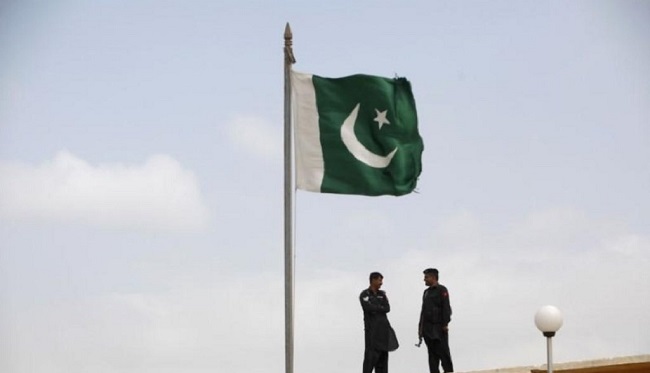FATF Asia-Pacific Group puts Pakistan in terror 'blacklist'
The Asia Pacific Group of the FATF, a global watchdog for terror financing and money laundering, has put Pakistan in a terror 'blacklist' for its failure to curb funnelling of funds to groups responsible for scores of attacks in India, officials here said on Friday.

New Delhi: The Asia Pacific Group of the FATF, a global watchdog for terror financing and money laundering, has put Pakistan in a terror 'blacklist' for its failure to curb funnelling of funds to groups responsible for scores of attacks in India, officials here said on Friday.
While putting Pakistan in an 'Enhanced Expedited Follow Up List', the Financial Action Task Force's Asia Pacific Group also found that the country was non-compliant on 32 of 40 compliance parameters related to terror financing and money laundering, they said.
The FATF APG meeting was held in Canberra, Australia, and the discussions, which ended Friday, lasted more than seven hours over two days.

India is a member of both the APG and the FATF consultations and was represented by a team of officials from the ministries of Home, External Affairs and Finance.
Pakistan's multi-ministerial team at the APG meeting was led by the Governor of the State Bank of Pakistan.
Also Read: Four renowned IAS Toppers to give success mantra to UPSC aspirants
"The APG has placed Pakistan in the Enhanced Expedited Follow Up List (Blacklist) for failure to meet its standards," an Indian official privy to developments said. He added that it had failed to stop funding to groups like the Lashkar-e-Taiba and the Jaish-e-Mohammed.

Actions demanding a review of Pakistan's compliance record were pushed by the US, the UK, Germany and France.
Despite its efforts, Pakistan could not convince the 41-member APG plenary to upgrade it on any parameter, he said.
Also Read |
Salahuddin admits to having carried out terror attacks in India
On 11 "effectiveness parameters" of terror financing and money laundering, Pakistan was adjudged low on 10.

Pakistan now has to focus on avoiding the FATF blacklist in October, when the 15-month timeline on the FATF's 27-point action plan ends, another official explained.
Pakistan has been under the FATF radar for its complicity towards terror groups LeT, JeM and others, he said.
It is almost certain that Pakistan will continue in its present status in the FATF 'Grey List' and there is every possibility that the country may further be downgraded into the FATF 'Black List' at its next plenary to be held in October in Paris, officials said.
Pakistan's continuance in the 'Grey List' means its downgrading by the IMF, the World Bank, the ADB, the EU and also a reduction in risk rating by Moody's, S&P and Fitch.
This will add to the financial problems of Pakistan, which is seeking aid from all possible international avenues.

During the FATF meeting, several countries voiced concern on the country's failure to do enough to contain terror funding on its soil.
According to officials, a key point made by these countries is the absence of a proper understanding in Pakistan of "transnational risk" -- risk posed to neighbouring and other nations by designated terrorist organisations based in Pakistan.
In June 2018, Pakistan was placed in the 'Grey List' and given a 27-point action plan by FATF. This plan was reviewed at the last plenary in October 2018 and again in February, when it was again put into the 'Grey List' after India submitted new information about Pakistan-based terrorist groups.
Also Read |
Pakistan: Blast on Lahore road injures 46
In a bid to bluff the financial watchdog, Pakistani authorities have shown arrests of LeT, JeM, Jamat-ud-Dawah (JuD), Falah-e-Insaniat Foundation (FIF) and Falah-e-Insaniat Foundation (FiF) cadres, officials said.
However, most were apprehended under its Maintenance of Public Order (MPO) Act and very few under the Anti-Terrorism Act, 1997.
Under the MPO Act, authorities cannot hold a detainee beyond 60 days. Pakistan has detained JeM founder Masood Azhar and LeT founder Hafiz Saeed mostly under laws that provide for detention for apprehension of breach of peace.

Pakistan recently submitted a 450-page compliance document that details all the changes the government has made to existing laws, and actions against terror groups in the past year and a half.
It claimed it has charged Hafiz Saeed with terror financing, and frozen all assets of the JuD and other UNSC banned outfits this year, as part of its ongoing efforts to crack down on terror.
The FATF implements UN's decisions on terror designations which do not warrant arrest. They ask only for freeze of funds, denial of access to weapons and travel embargo. The financial watchdog also wants nations to impose penalties that are proportionate and dissuasive.
The FATF currently has 35 members and two regional organisations - European Commission and Gulf Cooperation Council.
In the last FATF plenary held in Paris last year, it said Pakistan should continue to work on implementing its action plan to address its strategic deficiencies.
This would include adequately demonstrating its proper understanding of the terror financing risks posed by the terrorist groups and conducting supervision on a risk-sensitive basis, demonstrating that remedial actions and sanctions are applied in cases of Anti-Money Laundering and Combating Financing of Terrorism violations and that these actions have an effect on AML/CFT compliance by financial institutions. (PTI)
 Dynamite News
Dynamite News 